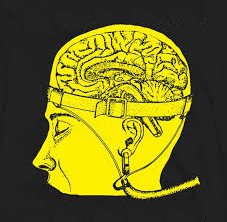Mind control/Child Abuse
(Social control, Torture, Psychological warfare, Psyop, SRA) | |
|---|---|
 | |
| Mind Control aims to gain domination over the victim by making them cede their autonomy to the controlling person or group. Children are especially vulnerable to spiritual, emotional, physical and sexual abuse. |
The history of Mind Control is intimately interwoven with child spiritual, emotional, physical and sexual abuse. Almost all victims of severe forms of mind control report being sexually abused as infants by adults or caretakers[1].
Child abuse
Mind Control builds on the manipulation of attachment needs [1]. The need for attachment increases in the face of danger. For example, with the Stockholm Syndrome, victims of hostage situations begin to identify and empathize with their captors [2]. It is of vital importance to acknowledge that newborn mammals can not survive without a caretaker and that for biological reasons the need to bond with a protective figure may be hardwired in the brain. [3] [4]
A paradoxical situation arises when caretakers are simultaniously the source of terror: abused children often cling to their abusers and are easier to manipulate because of their increased need for protection and attachment [5] . Traumatic bonding legitimizes the inappropriate behaviors and demands of the perpetrator and, thus, may provide a sense of peace for the victim [6] .
The child may feel the need to incorporate the belief system of the perpetrator, think as he does, feel guilty, forget and obey "willfully". Traumatic bonding enables the perpetrator to rationalize the abuse.
The manipulation of attachment needs combined with fear tactics and suggestion ranges on a continuum from influencing others, to shaping believes and behaviour, to inflicting severe trauma, to building mental robots.
Examples
| Page name | Start | End | Perpetrators | Description |
|---|---|---|---|---|
| Extreme Abuse Surveys | ||||
| Paedophile | ||||
| Ritual abuse | ||||
| The Pedophocracy | A term coined by David McGowan, who claims that the abuse of children forms a part of the habits of control of the ruling elite. | |||
| Traumatic bonding | paradox dependency reaction due to victim's evoked care-seeking behavior | |||
| VIPaedophile | Allegations of pedophilia amongst the most senior positions in society are persistent in many countries, as is the pattern of official denial, losing documents, sudden deaths of researchers and failure to prosecute. |
Related Documents
| Title | Type | Publication date | Author(s) | Description |
|---|---|---|---|---|
| Document:Theresa May's Father | Article | 2017 | Johnny Vedmore | So what is it that you fear Mrs May? The truth about your colleagues, or is it something much closer to home? Maybe May is terrified of people connecting her with the name Brasier? |
| File:SATANIC CULT AWARENESS.pdf | report | 27 January 1993 | Gayland W. Hurst Robert L. Marsh | This training manual is the result of compiling information from several years of occult investigations including volumes of written documentations from several investigators across the nation. |
References
- ↑ a b Orit Badouk Epstein, Joseph Schwartz, and Rachel Wingfield Schwartz (ed.) (2011) RITUAL ABUSE AND MIND CONTROL: The Manipulation of Attachment Needs, London: Karnac Books. https://deprogramwiki.com/deprogramming/ritual-abuse-and-mind-control-the-manipulation-of-attachment-needs/#Towards_a_definition_of_spiritual_abuse
- ↑ Gachnochi, G., Skunik, N. (1992). The paradoxical effects of hostage taking. International Social Science Journal, 44, 235-246.
- ↑ Bowlby, J. (1971) Attachment and loss. London: Penguin Books.
- ↑ Bowlby, J. (1973). Separation: Anxieties and anger. London: Penguin Books.
- ↑ van der Kolk, B. A. (1989). The compulsion to repeat the trauma: Re-enactment, revictimization, and masochism. Psychiatric Clinics of North America, 12, 389-411. online: http://www.cirp.org/library/psych/vanderkolk/
- ↑ Simpson, Laura (2006) Trauma reenactment: rethinking borderline personality disorder when diagnosing sexual abuse survivors. Journal of Mental Health Counseling, Apr 1, 2006. online: https://www.thefreelibrary.com/Trauma+reenactment%3a+rethinking+borderline+personality+disorder+when...-a0144666295